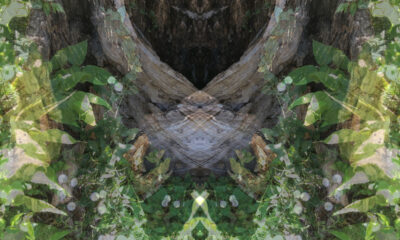
Haunted MTL Original – Among The Flayed – Ben Spencer
Among The Flayed by Ben Spencer
Mygento sold their agrochemical seed steroid under the trade name “Sorocom,” but after a year on the market, a period in which it turned most farmers who used it and most people who ate the food they produced into shambling lepers, the FDA pulled it and declared a National Health Emergency.
It was too late for twenty thousand or so families and the counties they lived in throughout the midwest, 55,000 square miles of which––roughly the size of Iowa––was quarantined by the Army and the National Guard. Second Amendment supporting militias who had guns to spare and recruits eager for action helped patrol the borders of the containment zone.
In the common vernacular of middle America, Sorocom came to be known as “The Flayer,” and victims of its horrific side effects came to be known as “The Flayed.”
This brief history of Sorocom is running through my head as Rex is driving us down some unnamed access road in a wheat field, away from a pack of the Flayed that found us hiding in Ted Johnston’s hayloft with a dozen others.
Rex puts the old diesel truck into third gear. It belches out black smoke, obscuring the rearview. Looking through the oily cloud, I see the Flayed disappear.
But they’re still coming. They’ll never stop coming.
Rex did what he always did when he got into the truck. No matter how many unhealthy life choices he made––junk food, whiskey, chewing tobacco––Rex always buckled his seatbelt.
“Where do we go?” I ask. “What do we do?”
Rex holds his side. Maybe a stitch from sprinting to the truck. We barely made it. Rex was pulled out of the truck by one of the Flayed, but managed to unholster his revolver and blow its head off before the others got to him.
“We buy our time, Cherry,” he says. “We survive.”
I love that Rex still calls me by my pet name despite the chaos. He started calling me Cherry shortly after we started dating, a year before we got married. It’s a reminder that things were normal once.
Rex downshifts to pull around a hairpin turn. The wheels of the truck skid before finding traction and the rear end fishtails in a plume of dust.
I still wonder how we escaped the fate of so many thousands of other families. We speculated that the chemical properties of Sorocom that caused some peoples’ flesh to shed from their bodies were unstable. It was as if the drug had discretion. It picked and chose its victims, but without any logic that I could make sense of.
Staring at the ceiling at night, I often wondered if it would have been better to be among the first wave of people who’d become flayed. The transformation looked agonizingly painful. But I always imagined it would have been better to get it over with, better to be spared from witnessing the horrors of this new world.
Three farmhouses ago, I saw Eustice Jones’ husband Bill became flayed before my eyes.
I mark time by “farmhouses” now. The days and weeks started blending together not long after cellular service ceased, and I lost track of time.
On the run, we’d occupy a farmhouse, be discovered, and leave. Occupy a new one, get overwhelmed by the Flayed, and relocate. Each cycle constituted one “farmhouse.” In truth, “days” and “weeks” didn’t matter anyway, because it felt like we’d been on the run for years. I’d counted eighteen farmhouses so far, so many that I forgot who they all belonged to.
When Bill Jones became flayed, it started with his face. We were eating dinner, laughing and smiling and remembering the world as it used to be. Then Bill’s face turned into a frown. Working as a part-time nurse before the world fell, I’d seen my fair share of stroke victims. That’s what it looked like––that Bill lost control of the muscles in his face.
Eustice, his wife, asked what was wrong. And as Bill tried to answer, looking just as stunned as the rest of us, the skin from his face slipped off of the muscle that gave it shape, leaving a blood-red mask. Within seconds, the same thing had happened to the rest of his body. Within a minute, he’d killed three of us.
My attention comes back to the cab of the truck, to Rex, my last beacon of happiness and hope. He’s holding his side. His eyes are watering––no, he’s crying.
“I love you, Cherry.”
He upshifts, fourth gear, speeding faster down the road. The speedometer hits forty miles per hour. The truck rumbles across the hard-packed earth.
Rex’s face changes into a frown. The same frown I saw come across Bill Jones’ face.
“Rex, you’re scaring me.”
His face sags. The stroke. His skin becomes slippery, elastic. Then it starts to fall off onto his lap.
“Jump out of the truck Cherry,” he says, his jaw a sickening crimson. “I’m not going to slow down, I’m going to crash it. I won’t let it happen to me.”
He pulls up his shirt, showing me a deep gash in his side.
One of the Flayed bit him before he managed to get into the truck.
Suddenly, everything that made Rex the man I fell in love with, over beers in a smoky pool hall, slips away. The flesh sheds completely from his face. Now, Rex is reduced to a grinning skull covered in shiny red sinew. And he becomes terrifyingly aggressive like they all do. Like I’ve seen a hundred times before.
Rex releases the steering wheel. He lunges for me. I close my eyes before it happens, but hear a sharp click as Rex’s seatbelt locks him in place. His jaws snap. He’s like a rabid dog. He pulls against the seatbelt, but the stringent automobile safety standards keep him locked in place.
The tears come, pouring from my eyes. I remember everything that made Rex and I happy. Even though we’d never been able to have children––even though three pregnancies had ended in miscarriage – we’d started a family, just the two of us. And we’d been happy.
Rex’s foot is locked against the gas pedal. The speedometer reaches sixty. I think of trying to stall the truck, to stop it somehow. If I jumped out at this speed, no matter how soft the field, I’d be injured or killed. And if I happened to live, the Flayed would catch up to me, like they always do.
Rex is still restrained by his seatbelt, struggling ferociously against it. My hand closes around the gear shift. In his calloused, farmer’s palm, Rex––this monster that used to be my husband––grabs my wrist and brings my arm to his mouth. I pull away before he manages to bite it. I reach and try to downshift again, but Rex grabs my arm, pulls it to his mouth with extraordinary strength, and snaps just as I manage to slip out of his grasp.
In this final, vicious struggle for life, I’m reminded that it won’t end well. None of this was ever meant to end well. There will be no federal relief. Waiting for the government and the army is not an option, because they are not here to help us––only to keep us contained. Only to let all of us become flayed. We die after twenty-four hours. Once everyone’s dead and gone, then they’ll come in to clean up the mess.
I wonder if God has a plan for me, or if my Christian religiosity has been a lie I’ve told myself for thirty-three years to believe that there is a plan, that there is meaning. That there is something, rather than nothing.
If I live in a Godless world, one without Rex––is that world worth living in? How many more farmhouses, now, by myself? How long until I’m flayed? What will the change feel like as the skin falls from my face? Will I remember who I was? Does our sanity depart as we become flayed? Are we trapped inside a body that is not ours? Do our souls live on, or do they, too, depart?
As these questions cross my mind, I make my decision. Death has the final word in any scenario. Dictating how I meet it is my last act of free will.
Rex’s foot has continued depressing the accelerator. We’re humming along at eighty-five miles per hour.
The wheat shines in the moonlight––a translucent amber blur.
I look into Rex’s eyes. I see a flicker of blue color that made me fall in love with him. It aids my decision.
“Goodbye Rex,” I say.
I unbuckle my seatbelt. I grab the steering wheel. I close my eyes and pull it towards me as hard as I can.
Before everything goes black, I feel the truck lift from the ground. I open my eyes. We’re flying over the moonlit wheat field, which––if there were still people to harvest it––would be nearly ready.
The moon fills the cab of the truck.
I close my eyes again. Gravity pulls the truck down to earth.

Ben Spencer lives with his wife and two beloved Boxer dogs in Washington state, where he works as a writer and content strategist for a tech company. Ben is currently at work on his second novel, a young adult horror story and homage to H.P. Lovecraft’s “The Dream-Quest of Unknown Kadath.”
Original Creations
Goodbye for Now, a Short Story by Jennifer Weigel
What if ours weren’t the only reality? What if the past paths converged, if those moments that led to our current circumstances got tangled together with their alternates and we found ourselves caught up in the threads?
Marla returned home after the funeral and wake. She drew the key in the lock and opened the door slowly, the looming dread of coming back to an empty house finally sinking in. Everyone else had gone home with their loved ones. They had all said, “goodbye,” and moved along.
Her daughter Misty and son-in-law Joel had caught a flight to Springfield so he could be at work the next day for the big meeting. Her brother Darcy was on his way back to Montreal. Emmett and Ruth were at home next door, probably washing dishes from the big meal they had helped to provide afterward, seeing as their kitchen light was on. Marla remembered there being food but couldn’t recall what exactly as she hadn’t felt like eating. Sandwiches probably… she’d have to thank them later.
Marla had felt supported up until she turned the key in the lock after the services, but then the realization sank deep in her throat like acid reflux, hanging heavy on her heart – everyone else had other lives to return to except for her. She sighed and stepped through the threshold onto the outdated beige linoleum tile and the braided rag rug that stretched across it. She closed the door behind herself and sighed again. She wiped her shoes reflexively on the mat before just kicking them off to land in a haphazard heap in the entryway.
The still silence of the house enveloped her, its oppressive emptiness palpable – she could feel it on her skin, taste it on her tongue. It was bitter. She sighed and walked purposefully to the living room, the large rust-orange sofa waiting to greet her. She flopped into its empty embrace, dropping her purse at her side as she did so.
A familiar, husky voice greeted her from deeper within the large, empty house. “Where have you been?”
Marla looked up and glanced around. Her husband Frank was standing in the doorway to the kitchen, drying a bowl. Marla gasped, her hand shooting to her mouth. Her clutched appendage took on a life of its own, slowly relinquishing itself of her gaping jaw and extending a first finger to point at the specter.
“Frank?” she spoke hesitantly.
“Yeah,” the man replied, holding the now-dry bowl nestled in the faded blue-and-white-checkered kitchen towel in both hands. “Who else would you expect?”
“But you’re dead,” Marla spat, the words falling limply from her mouth of their own accord.
The 66-year old man looked around confusedly and turned to face Marla, his silver hair sparkling in the light from the kitchen, illuminated from behind like a halo. “What are you talking about? I’m just here washing up after lunch. You were gone so I made myself some soup. Where have you been?”
“No, I just got home from your funeral,” Marla spoke quietly. “You are dead. After the boating accident… You drowned. I went along to the hospital – they pronounced you dead on arrival.”
“I don’t know what you’re talking about,” Frank said. “What boating accident?”
“The sailboat… You were going to take me out,” Marla coughed, her brown eyes glossed over with tears.
“We don’t own a sailboat,” Frank said bluntly. “Sure, I’d thought about it – it seems like a cool retirement hobby – but it’s just too expensive. We’ve talked about this, we can’t afford it.”
Marla glanced out the bay window towards the driveway where the small sailboat sat on its trailer, its orange hull reminiscent of the Florida citrus industry, and also of the life jacket Frank should have been wearing when he’d been pulled under. Marla cringed and turned back toward the kitchen. She sighed and spoke again, “But the boat’s out front. The guys at the marina helped to bring it back… after you… drowned.”
Frank had retreated to the kitchen to put away the bowl. Marla followed. She stood in the doorway and studied the man intently. He was unmistakably her husband, there was no denying it even despite her having just witnessed his waxen lifeless body in the coffin at the wake before the burial, though this Frank was a slight bit more overweight than she remembered.
“Well, that’s not possible. Because I’m still here,” Frank grumbled. He turned to face her, his blue eyes edged with worry. “There now, it was probably just a dream. You knew I wanted a boat and your anxiety just formulated the worst-case scenario…”
“See for yourself,” Marla said, her voice lilting with every syllable.
Frank strode into the living room and stared out the bay window. The driveway was vacant save for some bits of Spanish moss strewn over the concrete from the neighboring live oak tree. He turned towards his wife.
“But there’s no boat,” he sighed. “You must have had a bad dream. Did you fall asleep in the car in the garage again?” Concern was written all over his face, deepening every crease and wrinkle. “Is that where you were? The garage?”
Marla glanced again at the boat, plain as day, and turned to face Frank. Her voice grew stubborn. “It’s right here. How can you miss it?” she said, pointing at the orange behemoth.
“Honey, there’s nothing there,” Frank exclaimed, exasperation creeping into his voice.
Marla huffed and strode to the entryway, gathering her shoes from where they waited in their haphazard heap alongside the braided rag run on the worn linoleum floor. She marched out the door as Frank took vigil in its open frame, still staring at her. She stomped out to the boat and slapped her hand on the fiberglass surface with a resounding smack. The boat was warm to the touch, having baked in the Florida sun. She turned back towards the front door.
“See!” she bellowed.
The door stood open, empty. No one was there, watching. Marla sighed again and walked back inside. The vacant house once again enveloped her in its oppressive emptiness. Frank was nowhere to be found.

So I guess it’s goodbye for now. Feel free to check out more of Jennifer Weigel’s work here on Haunted MTL or here on her website.
Original Series
Nightmarish Nature: Just Jellies
Today on Nightmarish Nature we’re gonna revisit The Blob and jiggle our way to terror. Why? ‘Cause we’re just jellies – looking at those gelatinous denizens of the deep, as well as some snot-like land-bound monstrosities, and wishing we could ooze on down for some snoozy booze schmoozing action. Or something.
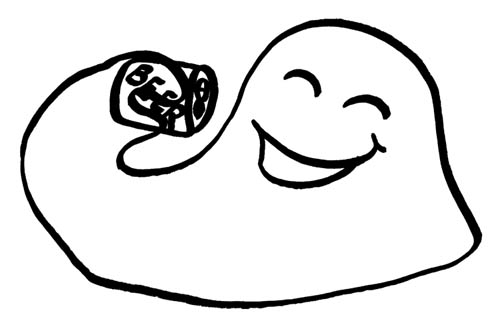
Honestly, I don’t know what exactly it is that jellyfish and slime molds do but whatever it is they do it well, which is why they’re still around despite being among the more ancient organism templates still in common use.
Jellyfish are on the rise.
Yeah, yeah, some species like moon jellies will hang out in huge blooms near the surface feeding, but that’s not what I meant. Jellyfish populations are up. They’re honing in on the open over-fished ocean and making themselves at home. Again.
And, although this makes the sea turtles happy since jellies are a favorite food staple of theirs, not much else is excited about the development. Except for those fish that like to hide out inside of their bells, assuming they don’t accidentally get eaten hanging out in there. But that’s a risk you gotta take when you’re trying to escape predation by surrounding yourself in a bubble of danger that itself wants to eat you. Be eaten or be eaten. Oh, wait…
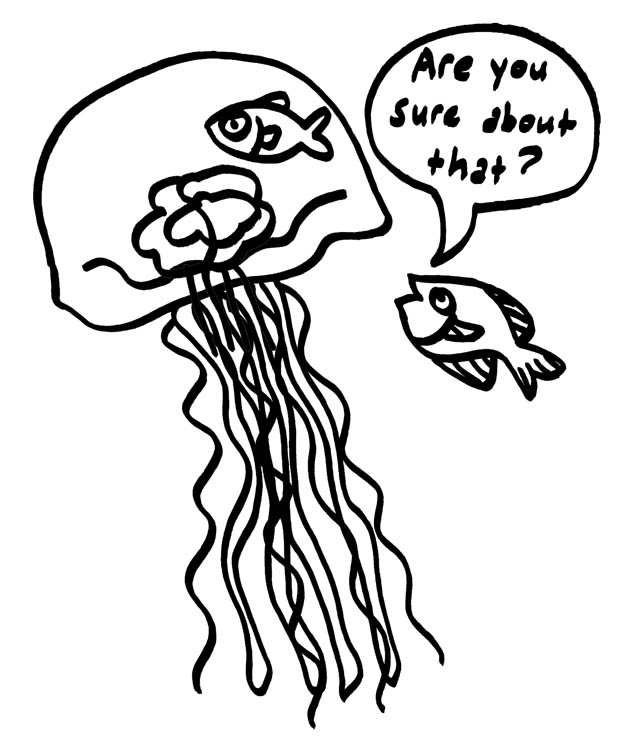
So what makes jellies so scary?
Jellyfish pack some mighty venom. Despite obvious differences in mobility, they are related to anemones and corals. But not the Man o’ War which looks similar but is actually a community of microorganisms that function together as a whole, not one creature. Not that it matters when you’re on the wrong end of a nematocyst, really. Because regardless what it’s attached to, that stings.
Box jellies are among the most venomous creatures in the world and can move of their own accord rather than just drifting about like many smaller jellyfish do. And even if they aren’t deadly, the venom from many jellyfish species will cause blisters and lesions that can take a long time to heal. So even if they do resemble free-floating plastic grocery bags, you’d do best to steer clear. Because those are some dangerous curves.
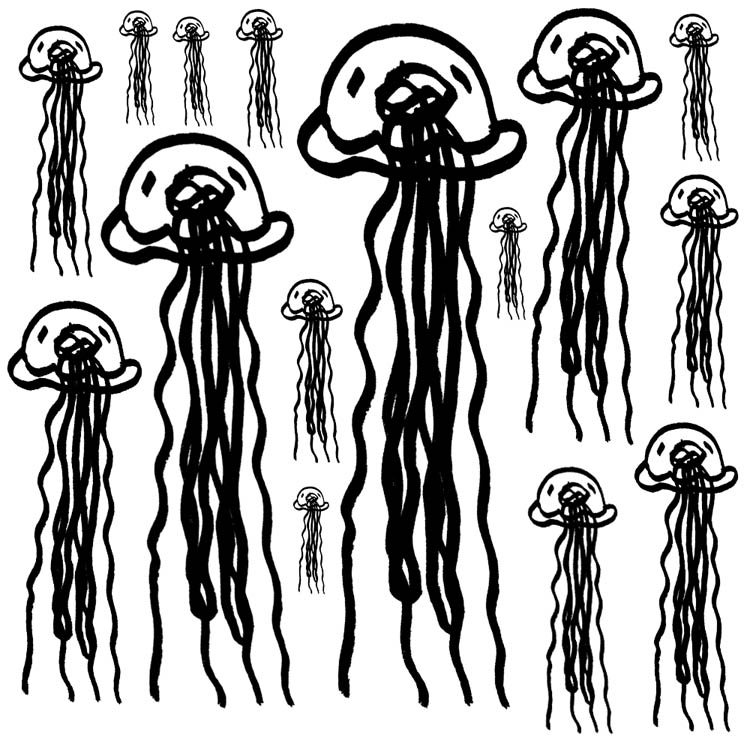
But what does this have to do with slime molds?
Absolutely nothing. I honestly don’t know enough about jellyfish or slime molds to devote the whole of a Nightmarish Nature segment to either, so they had to share. Essentially, this bit is what happened when I decided to toast a bagel before coming up with something to write about and spent a tad too much time in contemplation of my breakfast. I guess we’re lucky I didn’t have any cream cheese or clotted cream…
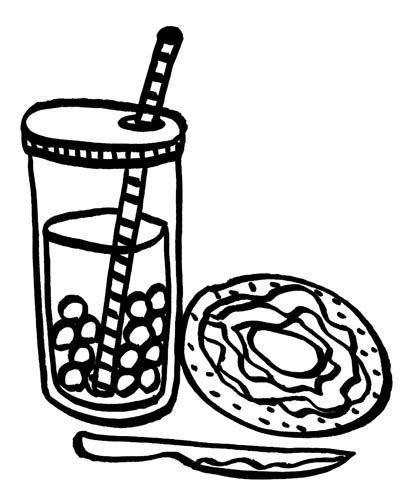
Oh, and also thinking about gelatinous cubes and oozes in the role-playing game sense – because those sort of seem like a weird hybrid between jellies and slime molds, as does The Blob. Any of those amoeba influenced creatures are horrific by their very nature – they don’t even need to be souped up, just ask anyone who’s had dysentery.
And one of the most interesting thing about slime molds is that they can take the shortest path to food even when confronted with very complex barriers. They are maze masterminds and would give the Minotaur more than a run for his money, especially if he had or was food. They have even proven capable of determining the most efficient paths for water lines or railways in metropolitan regions, which is kind of crazy when you really think about it. Check it out in Scientific American here. So, if we assume that this is essentially the model upon which The Blob was built, then it’s kind of a miracle anything got away. And slime molds are coming under closer scrutiny and study as alternative means of creating computer components are being explored.
Jellies are the Wave of the Future.
We are learning that there may be a myriad of uses for jellyfish from foodstuffs to cosmetic products as we rethink how we interact with them. They are even proving useful in cleaning up plastic pollution. I don’t know how I feel about the foodstuff angle for all that they’ve been a part of various recipes for a long time. From what I’ve seen of the jellyfish cookbook recipes, they just don’t look that appealing. But then again I hate boba with a passion, so I’m probably not the best candidate to consider the possibility.
So it seems that jellies are kind of the wave of the future as we find that they can help solve our problems. That’s pretty impressive for some brainless millions of years old critter condiments. Past – present – perpetuity! Who knows what else we’d have found if evolution hadn’t cleaned out the fridge every so often?
Feel free to check out more Nightmarish Nature here.
Original Series
Lucky Lucky Wolfwere Saga Part 4 from Jennifer Weigel
Continuing our junkyard dawg werewolf story from the previous St. Patrick’s Days… though technically he’s more of a wolfwere but wolfwhatever. Anyway, here are Part 1 from 2022, Part 2 from 2023 and Part 3 from 2024 if you want to catch up.
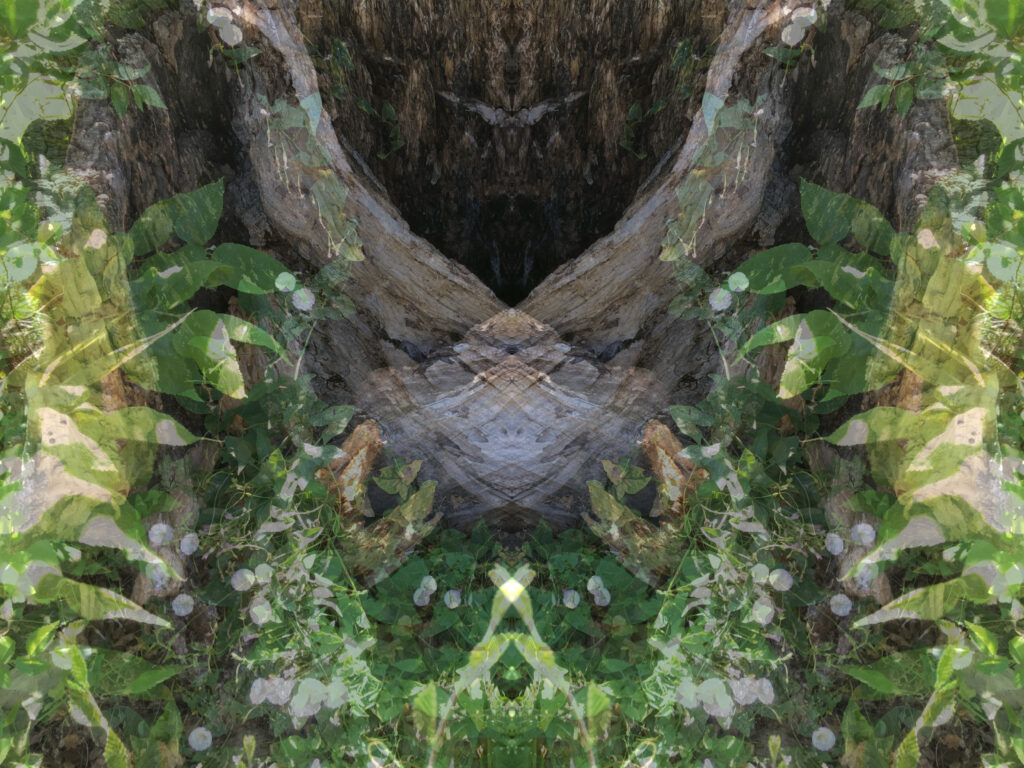
Yeah I don’t know how you managed to find me after all this time. We haven’t been the easiest to track down, Monty and I, and we like it that way. Though actually, you’ve managed to find me every St. Patrick’s Day since 2022 despite me being someplace else every single time. It’s a little disconcerting, like I’m starting to wonder if I was microchipped way back in the day in 2021 when I was out lollygagging around and blacked out behind that taco hut…
Anyway as I’d mentioned before, that Scratchers was a winner. And I’d already moved in with Monty come last St. Patrick’s Day. Hell, he’d already begun the process of cashing in the Scratchers, and what a process that was. It made my head spin, like too many squirrels chirping at you from three different trees at once. We did get the money eventually though.
Since I saw you last, we were kicked out of Monty’s crap apartment and had gone to live with his parents while we sorted things out. Thank goodness that was short-lived; his mother is a nosy one for sure, and Monty didn’t want to let on he was sitting on a gold mine as he knew they’d want a cut even though they had it made already. She did make a mean brisket though, and it sure beat living with Sal. Just sayin.
Anyway, we finally got a better beater car and headed west. I was livin’ the dream. We were seeing the country, driving out along old Route 66, for the most part. At least until our car broke down just outside of Roswell near the mountains and we decided to just shack it up there. (Boy, Monty sure can pick ‘em. It’s like he has radar for bad cars. Calling them lemons would be generous. At least it’s not high maintenance women who won’t toss you table scraps or let you up on the sofa.)
We found ourselves the perfect little cabin in the woods. And it turns out we were in the heart of Bigfoot Country, depending on who you ask. I wouldn’t know, I’ve never seen one. But it seems that Monty was all into all of those supernatural things: aliens, Bigfoot, even werewolves. And finding out his instincts on me were legit only added fuel to that fire. So now he sees himself as some sort of paranormal investigator.
Whatever. I keep telling him this werewolf gig isn’t all that it’s cracked up to be, and it doesn’t work like in the movies. I wasn’t bitten, and I generally don’t bite unless provoked. He says technically I’m a wolfwere, to which I just reply “Where?” and smile. Whatever. It’s the little things I guess. I just wish everything didn’t come out as a bark most of the time, though Monty’s gotten pretty good at interpreting… As long as he doesn’t get the government involved, and considering his take on the government himself that would seem to be a long stretch. We both prefer the down low.
So here we are, still livin’ the dream. There aren’t all that many rabbits out here but it’s quiet and the locals don’t seem to notice me all that much. And Monty can run around and make like he’s gonna have some kind of sighting of Bigfoot or aliens or the like. As long as the pantry’s stocked it’s no hair off my back. Sure, there are scads of tourists, but they can be fun to mess around with, especially at that time of the month if I happen to catch them out and about.
Speaking of tourists, I even ran into that misspent youth from way back in 2021 at the convenience store; I spotted him at the Quickie Mart along the highway here. I guess he and his girlfriend were apparently on walkabout (or car-about) perhaps making their way to California or something. He even bought me another cookie. Small world. But we all knew that already…
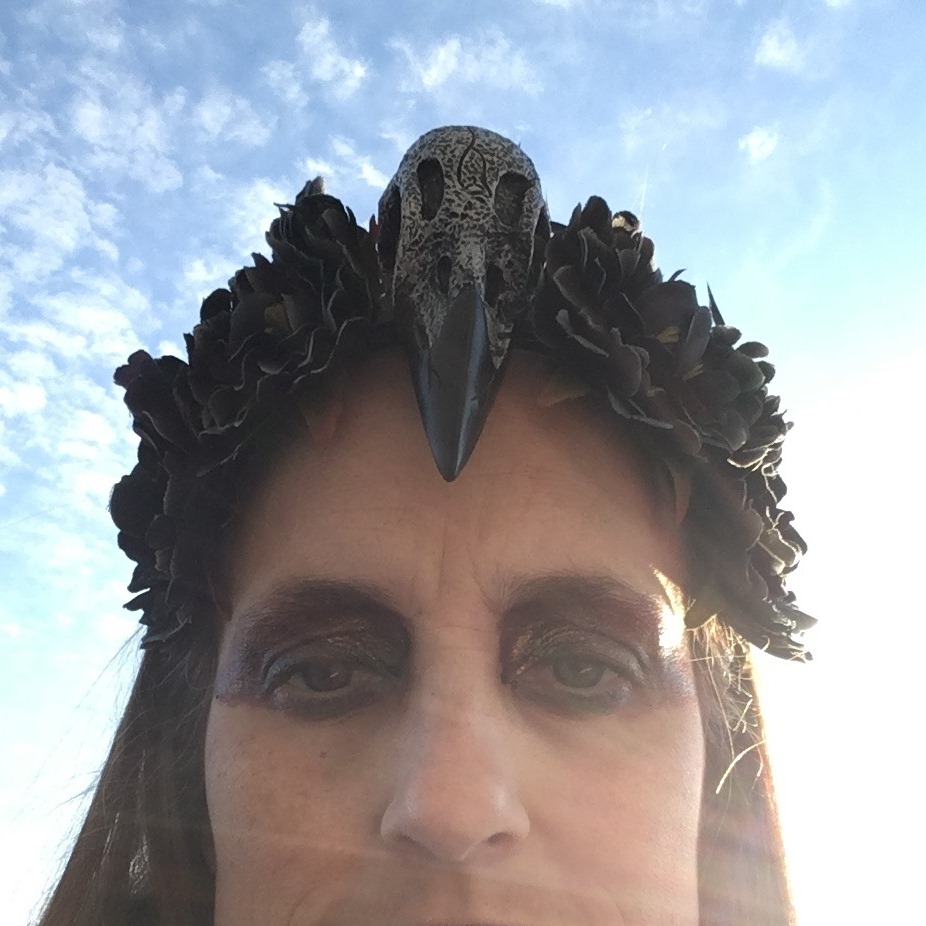
If you enjoyed this werewolf wolfwere wolfwhatever saga, feel free to check out more of Jennifer Weigel’s work here on Haunted MTL or here on her website.




